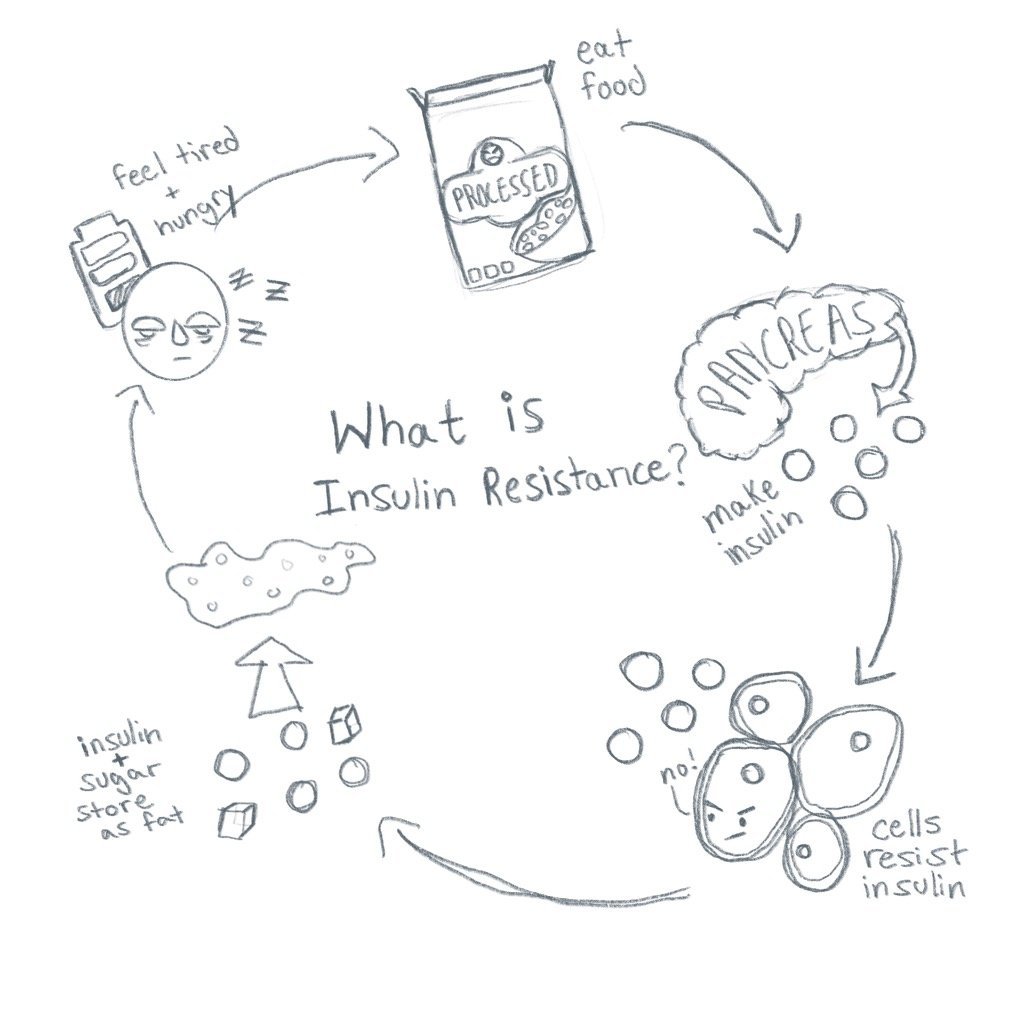Insulin Resistance/Sensitivity | Intermittent Fasting | Food Choices
How Insulin Works & Insulin Resistance
Insulin is a hormone produced in the pancreas. Insulin is essential to lower blood sugar levels and works by stimulating the uptake of glucose into cells to use for energy. After a meal, insulin helps the cells use carbs, fats, and protein as needed, and stores the remainder as fat for the future. Insulin resistance occurs when a cell stops responding to insulin and it becomes insulin resistant; cells need more insulin to do the same processes. Many conditions can cause insulin resistance- but the biggest factor is a diet that is high in refined carbohydrates, & seed oils that are rich in highly processed omega-6 fatty acids. Seed oils such as canola, soybean, sunflower, safflower, rice bran, corn, cottonseed, and grapeseed are in most packaged food items. Consuming ultra-processed foods regularly contributes to a host of diseases including: diabetes, infertility, heart disease, obesity, cancer, Alzheimer’s, etc.
Intermittent Fasting & Health Benefits
One of the easiest ways to improve our metabolic health is through a simple tool of intermittent fasting or extending our non-eating window. Fasting of various lengths can produce many amazing health benefits. One of the benefits is the release of stored insulin, and releasing stored insulin allows the body to burn fat and lower blood sugar levels. While in a fasted state, the body can tap into its fat-burning system (ketosis) to make energy, and ultimately improve insulin sensitivity. Research has widely shown that fasting also lessens inflammation, and can clear out toxins and damaged cells in the body.
Major takeaway: When cells become resistant to insulin, it is harmful to our health. Intermittent fasting is a tool that can be used to reduce insulin resistance and reduce risk of disease.
Best Food Choices
Best Fat Sources:
Olive oil
Avocado oil
Grass fed butter
Ghee
Nuts/seeds
Organic eggs
Wild fatty fish
Avocados
Olives
Full fat organic dairy
Best Protein Sources:
Nuts/seeds
Beans/legumes
Organic lean, hormone-free meat
Organic eggs
Full fat organic dairy
Tofu & tempeh
Wild fatty fish
Best Carbohydrate Sources
All fruits and vegetables
Squashes & potatoes (Yams, sweet potatoes, russet)
Quinoa, Brown rice, Other whole wheat/grains, oats
Legumes (lentils, peas, soybeans, peanuts)
Common Nutrition Myths (that are untrue!!)
Calories in, calories out is a good way to balance our nutrition for health and weight management. TRUTH: The quality of the foods we eat and the timing of meals is the most important factor for weight loss or weight management and overall metabolic health
We have no control over whether or not we will become insulin resistant or develop Type 2 diabetes TRUTH: Our food choices and when we eat/how often we eat, determine our metabolic health and whether or not we develop TYPE II diabetes, have high blood pressure, elevated blood glucose, etc.
ALL Fats are bad for us and should be used in moderation TRUTH: There are many healthy fats that are necessary for good health, and fat is one food category that does not spike an insulin response in the body. Including healthy fats in our diets help our bodies perform many essential functions.
Seed oils (canola, sunflower, safflower, soybean) are healthy and they provide us a source omega-6 fatty acids. TRUTH: These super-refined, industrial, seed oils contain an unhealthy amount (typically 70-80%) of omega-6 fatty acids/lineolic acid that can cause inflammation (via oxidation) and free radicals which both damage our bodies and create fat cells and excess fat storage in the body. These oils are healthy when consumed in moderation & typically are better when using them in recipes that you prepare yourself and not in processed foods.
Snacking throughout the day & eating many small meals is a good way to keep your blood sugar stable. TRUTH: The less often we eat, the less often insulin is released, and our alternative fuel source of fat is used to provide energy. Eating at meal times or 2-3x per day and within a 6-12 hour eating window, allows our bodies to repair and utilize stored fats.


